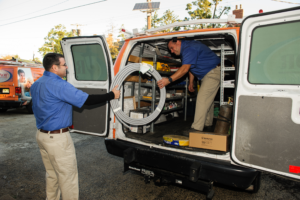Fuse Boxes & Circuit Breakers: What Do They Share in Common?
Let’s start with the similarities between a fuse box and a circuit breaker panel. Both of these electrical systems work to prevent problems associated with overloaded electrical circuits. This means they function as your home’s first defense against potential electrical fires. That said, they do so in very different ways, but in ways that complement each other.
How a Fuse Box Works
Fuses live in glass or or ceramic metal casings. They are made up of metal wire or filament. When fuses detect an electricity overload, the filament melts thereby shutting down the overheating electrical system. This usually happens pretty fast and once it does, the melted fuse will need to be replaced.
How Circuit Breakers Work
In homes, fuse boxes are typically found in basements or utility rooms. Most are grey and have a bunch of switches inside. When a switch gets thrown and the electricity in a particular area of the house goes off, it means there was an overload of electrical power. Maybe you were running too many appliances at once, or maybe there’s another larger electrical problem at play. Either way, when electrical currents reach unsafe levels, circuit breakers automatically flip the switch and power down.
Which is Best?
It’s difficult to say because each residential and commercial space is unique. There are advantages and downsides to both systems and they are unfortunately not entirely interchangeable. It may be that you need both for the right electrical protection.
Contact us today to learn more about the differences between fuses and circuit breakers and which might be best for your home or business.




